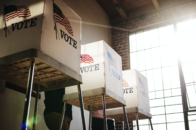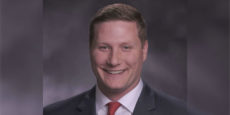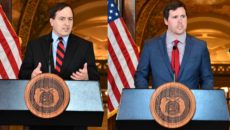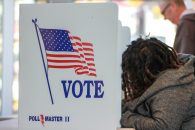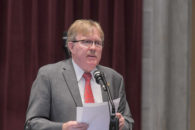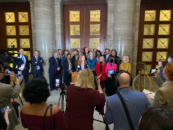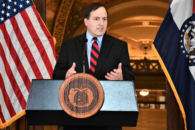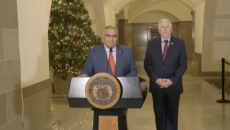On Tuesday, Missourians will decide on whether to expand Medicaid coverage after years of debate. The issue comes before voters as a ballot initiative to be decided on in the Aug. 4 primary election.
The measure has seen various challengers and supporters, as well as its fair share of controversy. Here’s a look at what Amendment 2 would do and the arguments on both sides of the issue.
What would Amendment 2 do?
The ballot language for Amendment 2 asks if voters wish to amend the Missouri Constitution to expand MO HealthNet services — the state’s Medicaid program — for individuals between 19 and 64 years old with an income level at or below 133 percent of the federal poverty level. It would also prohibit additional burdens on eligibility for enrollment standards.
The income benchmark would be set at less than $18,000 for an individual or $30,000 for a family of three.
So far, 37 states have bolstered their Medicaid programs — the most recent being Oklahoma, which voted to expand its program at the end of June.
If passed, the proposed expansion would take effect on July 1, 2021.
The history
The initiative, sponsored by Healthcare for Missouri and Missouri Health Care for All, garnered about 346,000 signatures — more than two times the 172,000 needed to qualify for the general election ballot — prior to the statewide shutdown due to the COVID-19 pandemic. Signatures were delivered to the Secretary of State’s Office at the beginning of May and verified within a month via “random sampling.” That tactic allowed the office to examine 5 percent of the signatures in order to verify the whole.
The following week, Gov. Mike Parson moved the initiative from the November ballot up to August. Having previously said he didn’t believe “it’s the time to be expanding” the program, Parson said the decision to move the vote was about “policy, not politics.”
“Missourians will determine the outcome, and it is critical that we hear their decision as soon as possible which is why we’re placing it on the August ballot,” Parson said. “This will give us more time to account for the outcome in our state budget.”
The opposition
Early opponents argued the measure was unconstitutional. Conservative groups United for Missouri and Americans for Prosperity-Missouri (AFP-MO) filed lawsuits against Secretary of State John Ashcroft, arguing the measure’s language violated Article III of the Missouri Constitution which requires ballot initiatives to cite a funding source.
“Auditor Nicole Galloway’s fiscal note shows that it is going to cost $2 billion per year when it is enacted,” AFP-MO State Director Jeremy Cady told The Missouri Times in May. “The state’s portion of that cost is 10 percent, which is $200 million. The way the initiative is written would force the Missouri legislature to appropriate the funds to cover these new costs. This initiative petition is unconstitutional because it forces the state to appropriate funds to cover it, and it doesn’t provide a source to do so.”
Both lawsuits ultimately failed, with the Cole County Circuit Court and the Missouri Western District Court of Appeals finding no violation.
Opponents have also expressed concerns over the cost to Missouri taxpayers.
“If this would pass, it would add up to another 300,000 people to a system that’s already strained and is already consuming a massive portion of the state budget, as well as massive portions of the state’s general revenue spending,” Missouri Treasurer Scott Fitzpatrick said during a recent event at the Capitol. “What we’re talking about is a population that is mostly able-bodied, working-age adults. The state of Missouri already has very generous Medicaid opportunities.”
House Budget Chair Cody Smith also said Medicaid currently takes up 40 percent of the state’s budget and Missouri’s requirement for a balanced budget would likely cause Medicaid to compete with other state programs, including education and public infrastructure, for funding.
The support
Amendment 2 received endorsements from a number of organizations. The Missouri Chamber of Commerce and AARP Missouri backed the initiative, both calling it a job creator and a way to boost a struggling economy.
“We’ve seen a lot of rural hospitals close, and we have literally tens of thousands of members in rural Missouri who are struggling to get local health care,” AARP Missouri advocacy director Jay Hardenbrook said. “The really important thing is that the data shows that expanding Medicaid will actually save the state of Missouri money that we can invest in things like more senior services as well as education, higher education, and all of the services that the state relies on.”
The measure also received an endorsement from the NAACP.
Proponents have pointed toward the results other states have seen with expansion. In a recent op-ed, Paul Taylor, CEO of the OCH Health System, compared Missouri hospitals to those in Arkansas.
“In Missouri, 15 hospitals have closed since 2014 – 10 in rural locations. Hundreds more remain at risk, barely hanging on even before the global pandemic. The common thread: most to close are in the 13 states that haven’t expand Medicaid,” Taylor said. “The economic benefits of Medicaid expansion in Arkansas are apparent. Officials here have used more than $400 million expansion savings during the last three years to cut state income taxes and reduce payments previously allocated to the uninsured.”
During a debate held on “This Week in Missouri Politics,” Regional Health Commission Medical Director Dr. Heidi Miller said “the majority of these patients work and either don’t have health insurance available to them or can’t afford it” and expansion would allow doctors to provide the services they need to.

Cameron Gerber studied journalism at Lincoln University. Prior to Lincoln, he earned an associate’s degree from State Fair Community College. Cameron is a native of Eldon, Missouri.
Contact Cameron at cameron@themissouritimes.com.



